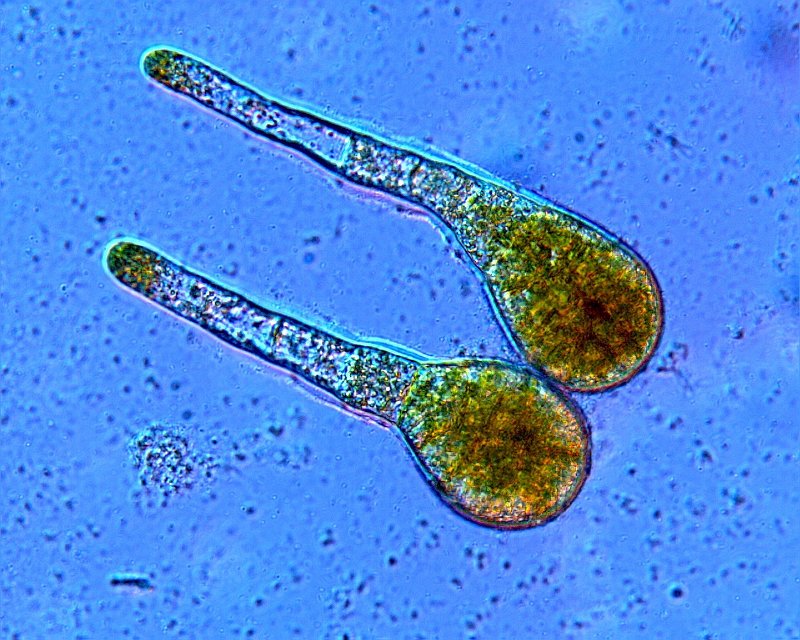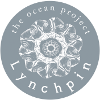Living Data
Evolving conversations 
University of Technology, Sydney Main Entrance Foyer, 3 Sept 2014 - 20 Nov 2014
In Ultimo Science Festival, Sydney3-12 Sept 2014
 Jennifer Clark collaborates with Paul Fletcher
Jennifer Clark collaborates with Paul Fletcher
Animator Paul Fletcher was really fascinated with the idea of seaweed embryos undergoing temperature stress associated with climate change and how they develop/respond differently to this stress. I provided sketches and microscope images for Paul to work with, as well as scientific papers to read.

Jennifer Clark
Blue Pair (embryos) 2014
Microscopic image
What inspired the work (a question, a feeling)?
I am interested in how different life stages of an iconic intertidal seaweed (Hormosira banksii) are affected by different temperatures found naturally on a latitudinal gradient and whether embryos from populations found in warmer environments closer to the equator would struggle with increasing temperatures or whether they would thrive in it. It's important to understand how coastal communities will respond to global warming due to the ecological role H. banksii plays as a foundation species (species that create a 3D habitat and provide resources for other organisms) in order to concentrate conservation efforts.
Paul was really fascinated with the idea of seaweed embryos undergoing temperature stress associated with climate change and how they develop/respond differently to this stress. I provided sketches and microscope images for Paul to work with, as well as scientific papers to read.
Seaweed gametes (eggs and sperm) were extracted from adult seaweeds from 4 populations spanning Northern NSW and Sydney area. These were cross fertilised and placed into petri dishes and grown in 6 different temperatures over 5 days. At 24 hours and 120 hours after fertilisation, images were taken of embryos as well as photosynthetic parameters to assess the health of the developing seaweeds.
My research is funded by an Australian Postgraduate Award Scholarship, for completion of a PhD administered by University of Technology in Sydney and the School of the Environment. Supervisors Martina Doblin (UTS), Alistair Poore (UNSW), Peter Ralph (UTS) provide support and a wealth of knowledge.
What people, papers, books, exhibitions, or other things inspire me?
There is a lot of literature in peer reviewed scientific journals of work on climate change effects on seaweed (too many to list!) however I am inspired by my science heroes Brian Helmuthand Christopher Harley. Both have done extensive work on climate change impacts within the intertidal as well as effects of temperature on body temperatures of these organisms.
Here are two journal articles by these scientists that really interest me:
Helmuth, B, Harley, C, Halpin, P, O'Donnell, M, Hofmann, G & Blanchette, C (2002). Climate Change and Latitudinal Patterns of Intertidal Thermal Stress, Science, 298, 5595: 1015-1017.
Harley, C, Anderson, K, Demes, K, Jorve, J, Kordas, R, Coyle, T & Graham, M (2012), Effects of climate change on global seaweed communities, Journal of Phycology, vol. 48, 5, p. 1064-1078.
What impacts do I hope my work will have? What feeling or message would I like people to take with them?
I hope that people will be inspired to conserve and protect coastal environments. Australia is home to the most endemic and species rich macroflora in the world and most of them live in our temperate coasts. With global warming these communities may disappear along with the organisms that rely on it. They are ecologically important, rich in biodiversity as well as provide ecosystem services.
Bio: My research explores the effects of global climate change, particularly the effects of increasing temperature, on the physiology of marine rocky intertidal macroalgae by assessing the underlying genetic components and phenotypic plasticity in thermal tolerance traits. Currently I am completing my PhD candidature as a member of the Plant Functional Biology and Climate Change Cluster (C3) and Coastal Oceanography and Algal Research Team (COAST) at the University of Technology in Sydney.
Jennifer ClarkUniversity of Technology in Sydney,
Plant Functional Biology and Climate Change Cluster (C3)
Publications
Clark, J.S., Poore, A.G.B, Ralph, P.J., Doblin, M.A. (2013). Potential for adaptation in response to thermal stress in an intertidal macroalga. J. Phycol. 49:630-639.
(Algal Highlight of my Paper) Bellgrove, A. (2013). "Turning up the heat." Journal of Phycology 49(4): 627-629.
Further engage:
Jennifer Clark, UTS Newsroom
Contact:
Email: Jennifer.Clark@uts.edu.au
Mobile: 0433249650











